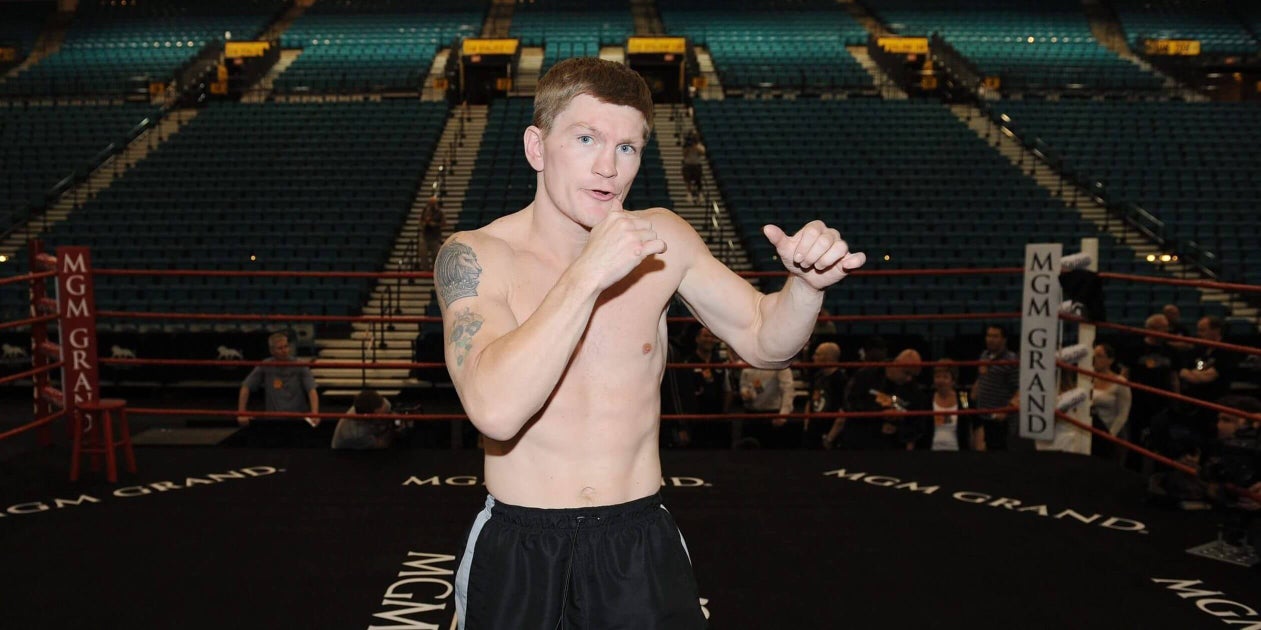There’s a moment, early on in Hatton, the 2023 documentary covering the life and career of British boxer Ricky Hatton, in which he delivers a line that at the time seemed poignant but now lands with the weight of one of his signature body shots. “I was a world champion four times over but I consider myself a failure,” he said. “It wasn’t supposed to end this way.”
After reports emerged on Sunday morning that the 46-year-old had passed away at his home in the town of Hyde in Greater Manchester, it sparked a deluge of tributes for a man who delivered some of British boxing’s most memorable moments, winning world titles in two weight classes and inspiring thousands of fans to travel the globe to watch him fight.
His brilliance inside the ring was matched by his character outside of it. It was that cocktail of raw talent and effervescent personality that made him so loved and respected.
Born in Stockport, to the south of Manchester, Hatton grew up in a pub run by his parents on a council estate in Hyde where he and his brother Matthew would help out, stacking shelves and carrying crates of beer up from the cellar for pocket money.
He was 12 years old when his mum and dad set up a small gym down among the crates and it was there he would spend hours landing shots on the heavy bag and honing his skills on the speed ball. As his punches got meatier, the sound carried up into the bar, causing curious customers to head downstairs and watch the youngster train.
By the time he was 15, he had joined a local boxing club and was showing great promise as a fighter. His talents did not extend to other professions — a brief stint in the family’s carpet-fitting business ended prematurely after Hatton cut four of his fingers with a Stanley knife. Fearful of impacting his future in boxing, his father Ray made him a salesman instead, but it quickly became clear that wasn’t his domain either. “He was selling them at the price we bought them for,” his father Ray told Time magazine in 2007. “If an old lady came in and she liked one but didn’t have the money, it was: ‘Go on, now, we’ll do you for that’, which is all very, very nice. But it wasn’t great for business.”
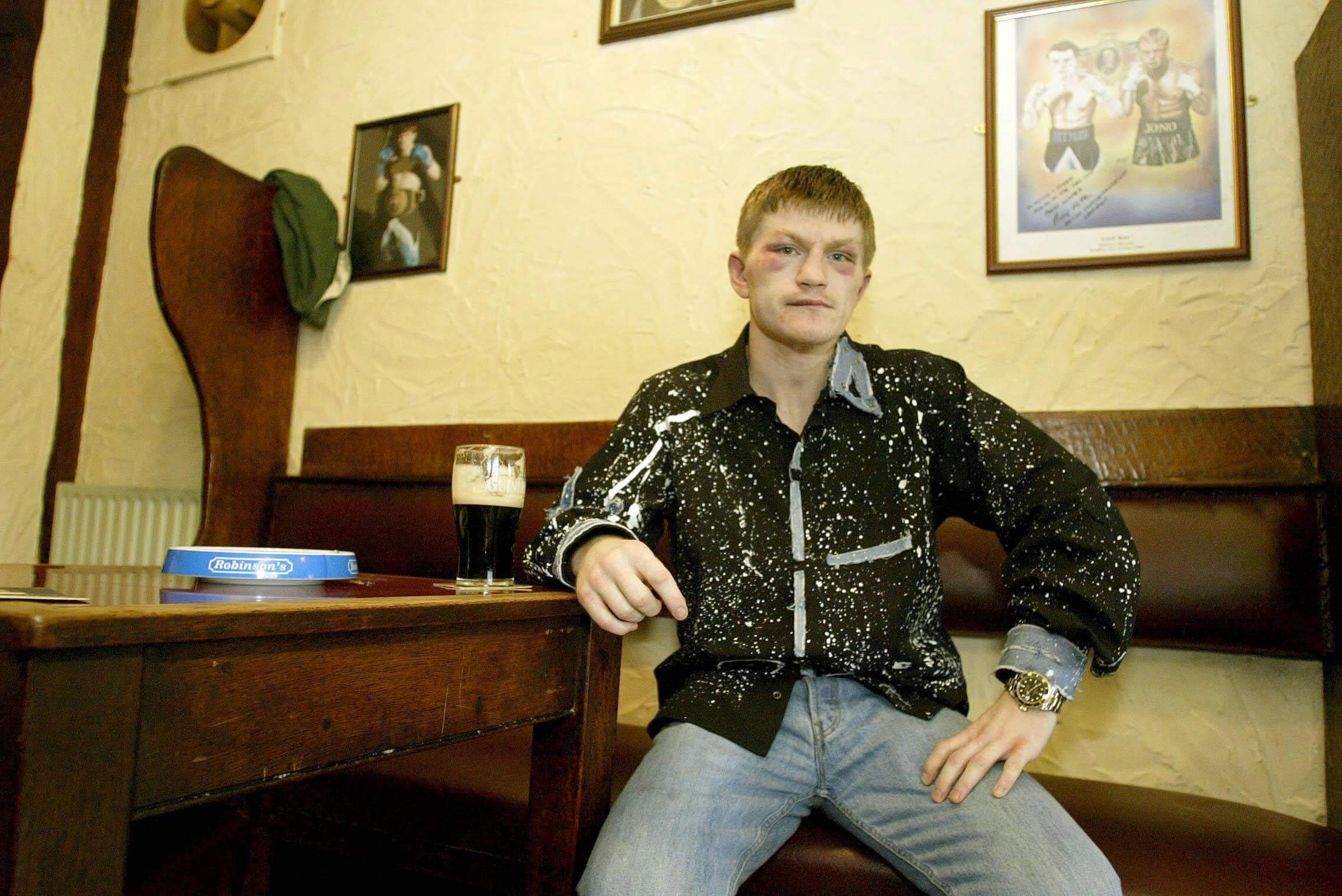
Ricky Hatton, pictured at The New Inn pub in Hyde in 2005 (Dave Thompson – PA Images/PA Images via Getty Images)
After a short amateur career in which he won seven British titles, Hatton turned professional at 18, joining Billy “The Preacher” Graham’s gym in Moss Side, Manchester, where his potential was spotted instantly. “It must have been like when Manchester United found George Best,” Graham said in 2006. “I told him that first day he was the best 17-year-old I had ever seen and if he wanted it badly enough, he could win whatever he wanted.”
The duo’s prolific partnership lasted from 1997 to 2008, spanning 45 fights, including 22 world title contests. During that time, Hatton built a devoted army of fans to whom he became a hero.
In many ways, he seemed just like them. He was unwaveringly dedicated to his football team, Manchester City, who held a minute’s silence in his honour before Sunday’s match against Manchester United. Thursday nights were spent playing darts and downing pints in the local pub. And he notoriously piled on the pounds in between fights, earning the nickname “Ricky Fatton”. Yet he did all this while carving out a career as one of the best fighters in the world.
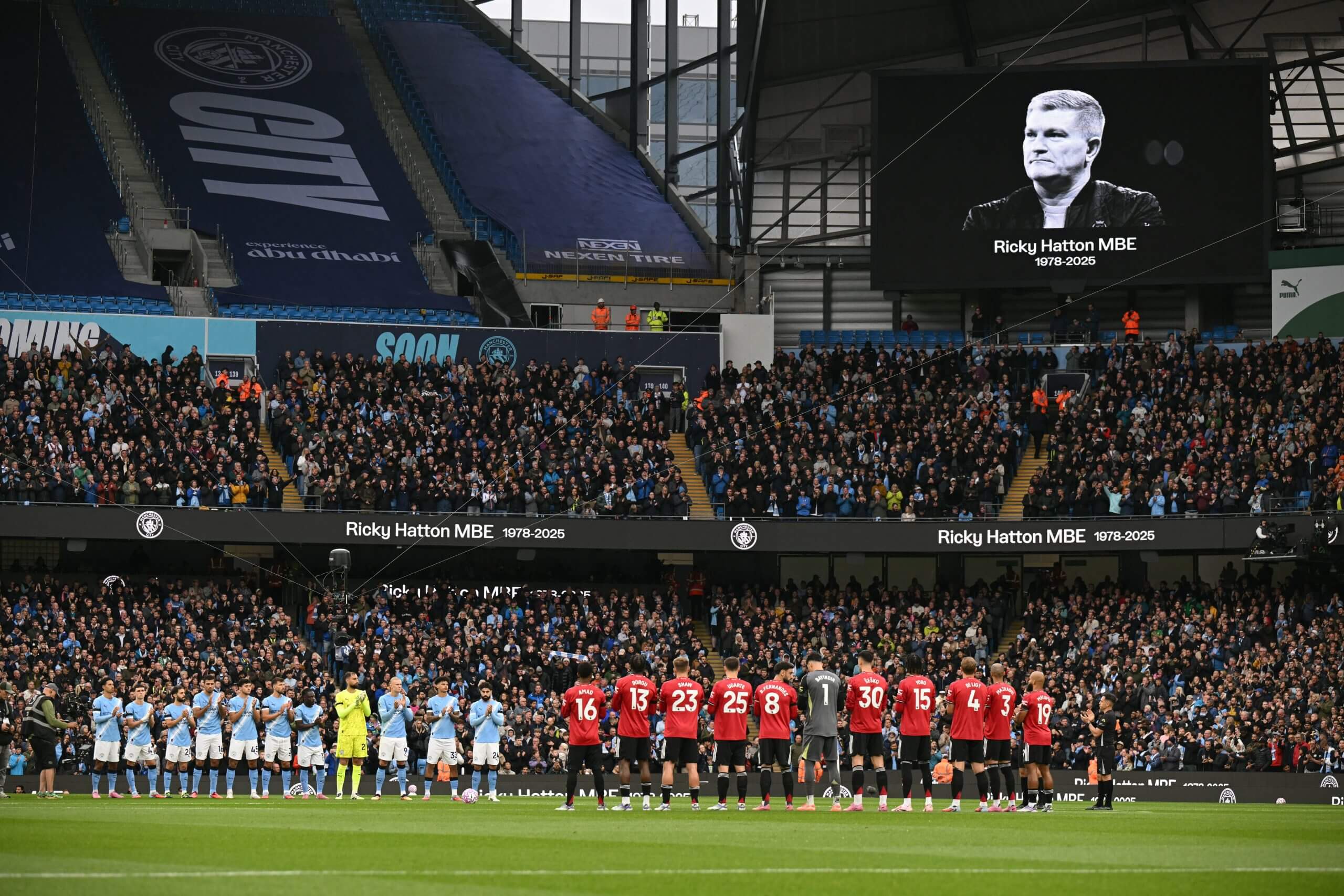
Manchester City held a minute’s silence for Ricky Hatton on Sunday (Oli Scarff/AFP via Getty Images)
His finest hour came on June 4, 2005, at the MEN Arena in Manchester, where he took on one of the top pound-for-pound fighters in the world, Kostya Tszyyu, for the IBF and The Ring junior welterweight championship. The Russian-born Australian had been the first man to unify the light welterweight division in 30 years and, at 35 years old, had been the champion for more than a decade, losing just once before meeting Hatton at the hands of Vince Phillips in 1997, a fight Ring magazine named Upset of the Year.
Few gave Hatton a hope of winning. But in a fight scheduled for 2am UK time to suit the American audience, the 26-year-old was determined to prove that he belonged among the best. In front of 20,000 raucous supporters, the pair traded blows with a vicious intensity that occasionally crossed the line into illegality. After the ninth round, Hatton returned to his stool and told his team he had nothing left to give.
“I don’t want to hear that from you,” responded Graham. “We knew we would be in this position one day and if you’re not man enough to take advantage, you’re not the fighter we’ve been telling everyone you was.”
After an 11th round in which Tszyu sunk his much-feared right hand into Hatton and saw his opponent’s legs stiffen but not buckle, the champion sat on his stool battered, bruised and broken. Behind on all three judges’ scorecards, his trainer Johnny Lewis threw in the towel and Hatton fell to the canvas in disbelief before breaking down in exhausted, elated tears on the shoulder of his trainer Graham. “The dream is made real!” screamed the Sky TV commentator Ian Darke as those in the arena tried to absorb what they’d just witnessed.
It is a moment that, in Britain at least, transcended boxing, becoming a moment of true sporting folklore. It reignited local interest in the sport and catapulted Hatton onto a whole new level of celebrity.
He went on to unify the division by beating Carlos Maussa a few months later before stepping up to welterweight to become a two-weight world champion, enduring a tough night in Boston against little-known Luis Collazo to win the WBA 147-pound crown. Some 18 months later, Las Vegas and Floyd Mayweather Jr came calling to present the opportunity of a lifetime for the British boxer and his legion of supporters.
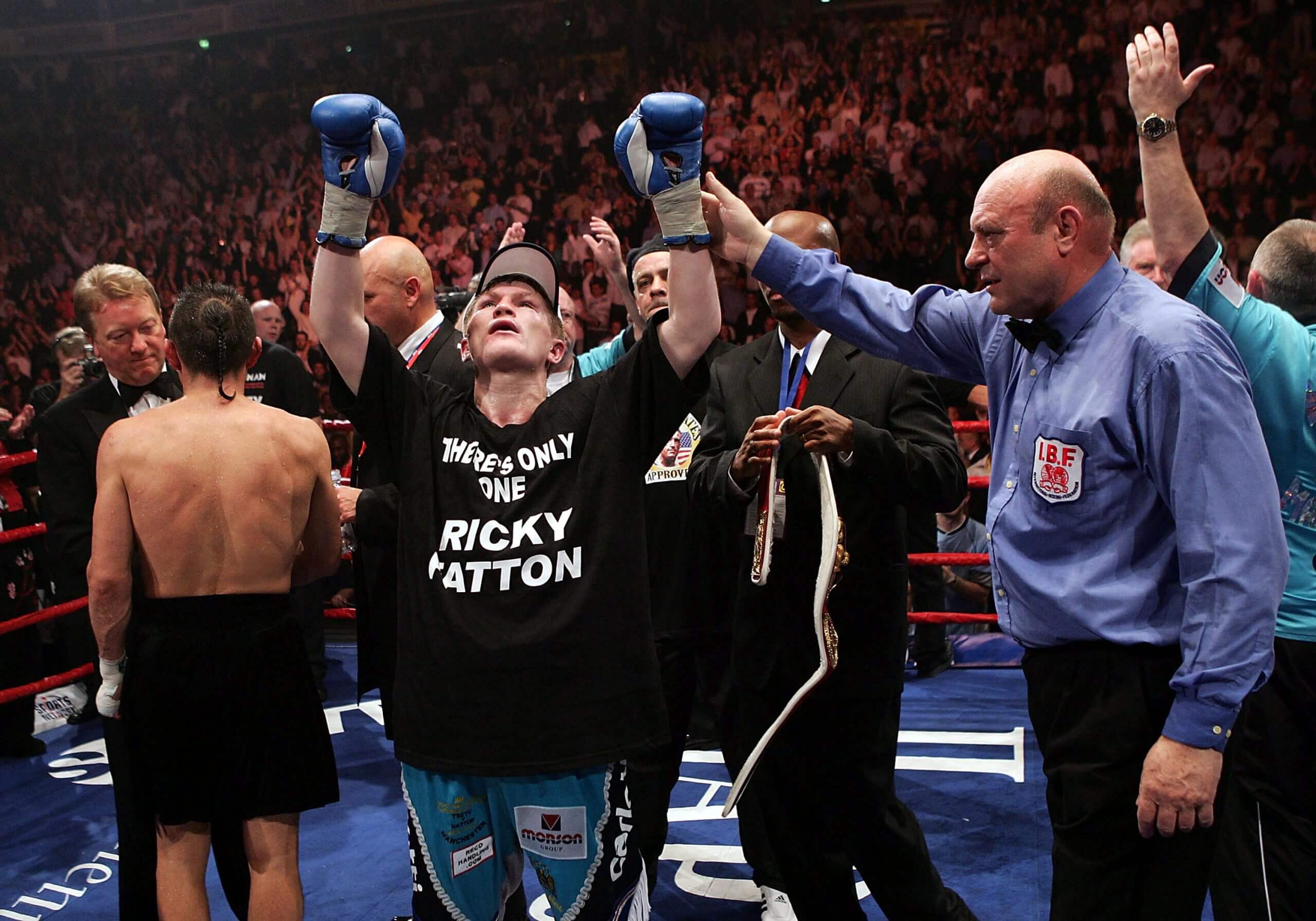
Ricky Hatton toasts his triumph over Kostya Tszyu at the MEN Arena (John Gichigi/Getty Images)
Mayweather was brash and bolshy, flaunted his wealth freely, the polar opposite of Hatton, and the American showed little respect for a fighter who had amassed a 43-0 record. “What’s the point of being the best fighter in the world, if everyone thinks you’re a d***head?” Hatton asked during the Manchester stop of the press tour ahead of their December 2007 meeting.
Between 20,000 and 30,000 fans flocked to Vegas with Hatton. Many did not have tickets to the fight but still produced scenes the likes of which Sin City had never seen. At the weigh-in the day before the fight, all 6,000 seats at the MGM Grand Garden Arena were full two hours before the fighters stepped near the scales.
And if there was any doubt over who most had come to see, it was banished by raucous renditions of “God Save the Queen” and “There’s only one Ricky Hatton”. Vegas might have been Mayweather’s home town but, for this weekend only, Hatton’s supporters had turned it into a mini-Manchester.
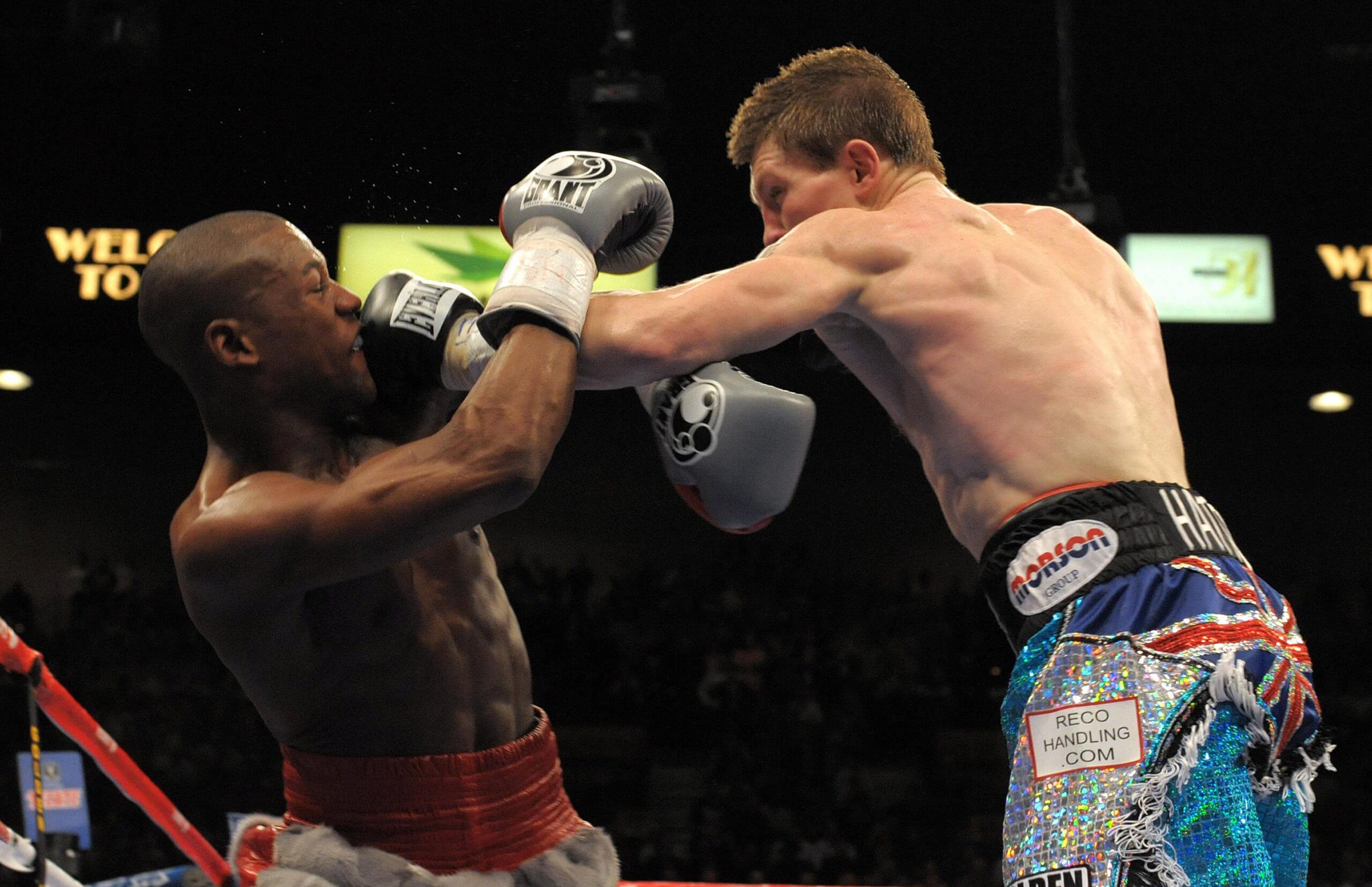
Hatton lands a shot on Floyd Mayweather Jr at the MGM Grand Garden Arena in 2007 (Gabriel Bouys/AFP via Getty Images)
This time, however, there was no dream ending. Mayweather knocked down Hatton twice in the 10th round to inflict his first defeat. The loss hit Hatton hard physically and mentally, though few knew just how hard until many years later when he started to speak openly about the battles with mental health that affected him following that first defeat.
In and out of the ring, he struggled to find any consistency. The highs of victories in front of his ever-loyal fans were followed by the lows of fractured relationships with his long-time trainer and best friend Graham, and later, his parents. After Manny Pacquiao inflicted the second defeat of his career with a brutal knockout in their Las Vegas meeting in 2009, Hatton teetered on the edge.
“I sat in the living room one day and thought: ‘I’ve got to retire now’ after the Pacquiao fight,” he said in an interview with TalkSport in 2023. “I thought my best days are behind me so. I had no boxing, no mum and dad, no Billy Graham. I was on my own and single at the time, and I thought: ‘What do I need to be here for? I’ve worked so hard and I can’t share it with anyone’, and I didn’t care if I lived or died.”
For three years, Hatton remained inactive as a boxer, consumed instead by the demons that haunted him. In an interview with the Guardian in 2012, he spoke openly about depression, drink and drugs, detailing how he would enter the pub and start crying before he’d had a single drink and how panic attacks became a frequent occurrence. “I hated the person I’d become,” he said.
When he emerged from the darkness, he weighed over 15 stone (95kg) but boxing once again presented a light in the gloom. Hatton came out of retirement for his first fight in over three years against Ukrainian boxer Vyacheslav Senchenko in November 2012. Having shed around five stone to meet the welterweight limit of 67kg (10st 7lb), Hatton stepped into the ring hoping it would be the first step back to becoming a world champion again; to giving himself an ending that he could accept.
In the ninth round, Senchenko sunk a painful body shot into Hatton’s midriff that left the 34-year-old writhing on the canvas in agony. “I needed one more fight to see if I had still got it, and I haven’t,” he said afterwards, retiring from the sport for a second time but assuring people he was “happy” while doing it. “I have got the answers I needed. I got the opportunity and I got the answers, and no matter how upsetting it is, I have got to be a man and say: ‘It is the end of Ricky Hatton’.”
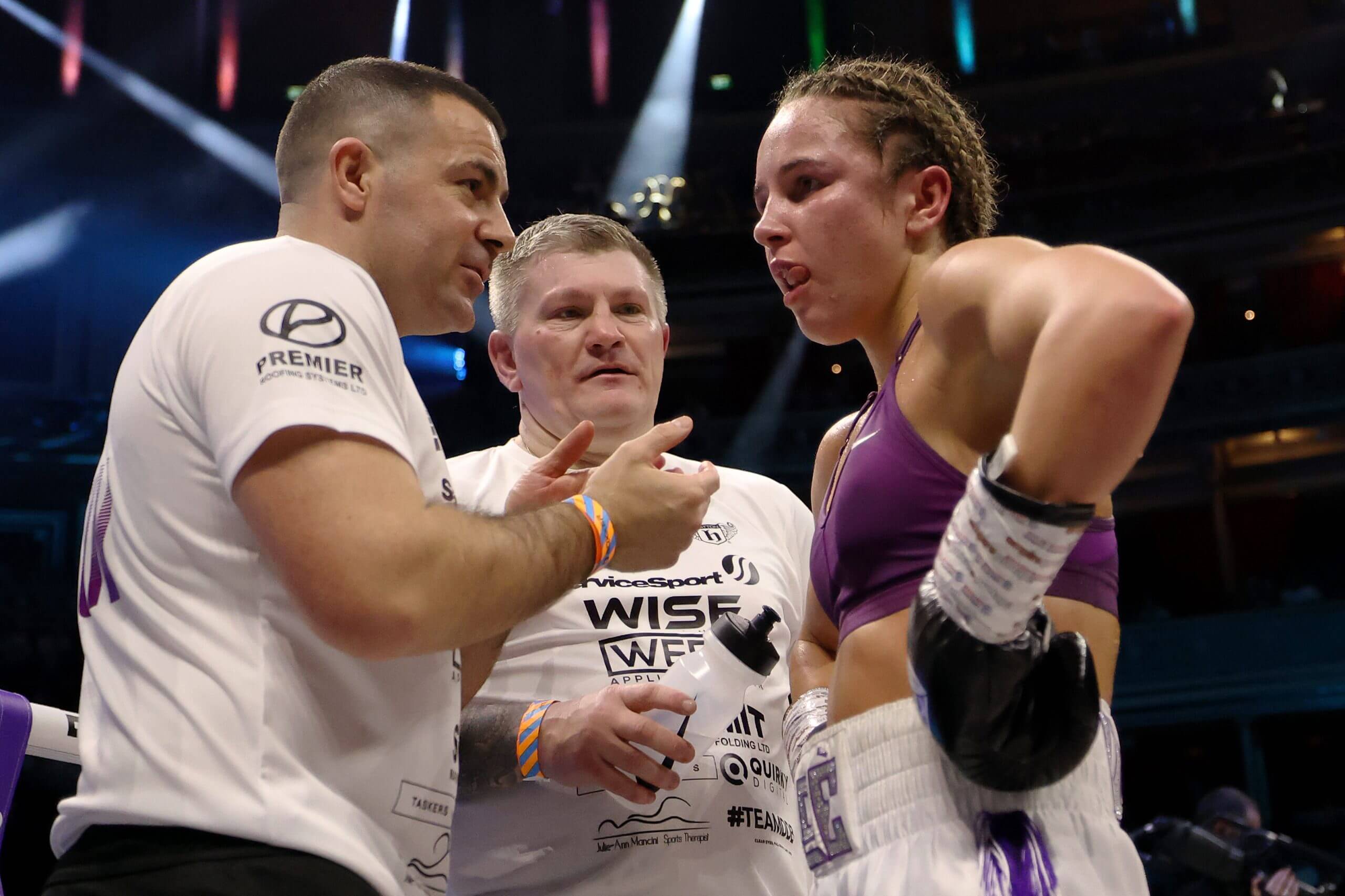
As a trainer, Hatton, centre, guided Chloe Watson, right, to the EBU European flyweight title earlier this year (James Chance/Getty Images)
He stayed in the sport, becoming a manager and trainer to many, and a friend and supporter to many more. After the news of his death emerged on Sunday, British promoter Ben Shalom of Boxxer wrote a post on Instagram detailing how Hatton gave him the belief and confidence to enter the sport as a 21-year-old, and from then on, was always there to lend support and encouragement.
“The truth is, Ricky didn’t support me because he thought I was going anywhere,” wrote Shalom. “He supported me because he supported people. He didn’t look down on anyone. He was a true man of the people, his city, and he wanted the best for everyone he met.”
His death came just hours after Las Vegas hosted its biggest boxing crowd in history for the fight between Saúl “Canelo” Alvarez and Terence Crawford. At the ceremonial weigh-in on Friday evening, this reporter sat stunned as fans filled the T-Mobile Arena and the buzz was as strong as any fight night.
“Have you ever seen an atmosphere like this for a weigh-in?” I asked a more senior reporter sat beside me.
He smiled. “Oh yes. Hatton versus Mayweather. That was special.”
Hatton’s story was special. But it wasn’t supposed to end this way.
(Top photo: Denise Truscello/Getty Images)

